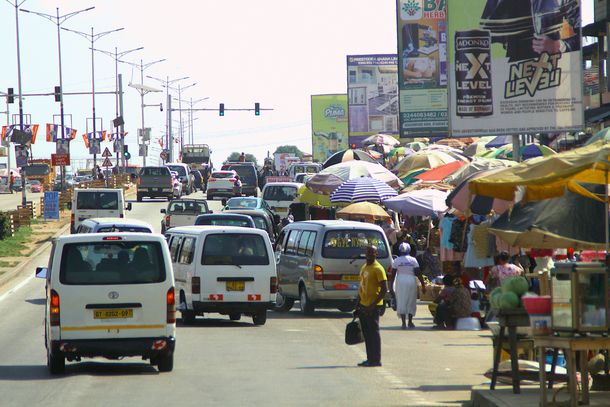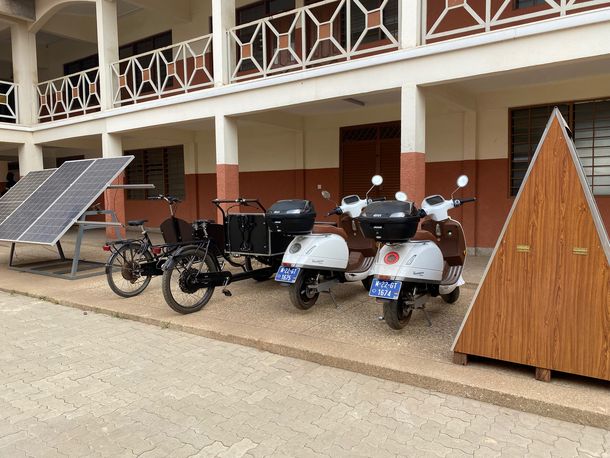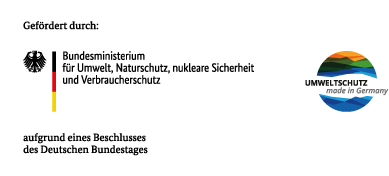MoNaL - Thinking mobility sustainably across the life-cycle
Starting point in Ghana

The Republic of Ghana is experiencing sustained population and economic growth. With the economic development, the demand for mobility services, which exists mainly for cars and mopeds, increases significantly. As these vehicles simultaneously create a high environmental impact there are opportunities for more environmentally friendly alternatives through e-mobility. However, to improve the environmental impact, it is important that the electricity needed is sourced in a renewable manner.
The power grid in Ghana is not well developed. Although the electrification rate has increased to 86% in recent years, power outages are still frequent. Because solar home systems do not provide sufficient power to charge e-vehicles, this poses a challenge for the country in the implementation of e-mobility systems. Other factors such as local conditions, suitable roads, e-waste, and a lack of know-how in the operation and maintenance of vehicles further complicate the situation.
Mobility for Sub-Saharan Africa - Sustainably over the life cycle

The MoNaL project aims to create sustainable mobility opportunities for sub-Saharan Africa countries. The impact of the mobility offer is considered, improved and verified through Life Cycle Assessment (LCA) throughout the entire life cycle – from vehicle production and design to energy supply to vehicle recycling and energy supply infrastructure. As part of a pilot implementation in Ghana on Don Bosco Campus, a rental system for e-mopeds and cargo bikes will be technically and economically tested and adapted considering local conditions and user requirements. Sustainable mobility must be thought of in the context of renewable energy supply. For this reason, the project is developing a smart mini-grid consisting of self-sufficient solar systems and charging stations, which, unlike individual plants, has sufficient power to supply the electric vehicles. Part of the mini-grid is an automatic billing system that enables power consumption of vehicles and smart load management by adjusting the electricity price to supply, demand, weather and battery level in real time.
The overarching aim is to intensify the use of sustainable mobility alternatives while at the same time considering the necessary access to reliable and sustainable energy. Given the low state of e-waste management in Ghana, the final phase of the life cycle of the developed product system is considered in the sense of a holistic view. For this purpose, existing recycling structures in Ghana will be analyzed, options for second-life applications of solar modules and batteries will be examined, workshops for the development of environmental standards will be organized with stakeholders, and qualification measures in the field of recycling and upcycling will be carried out. In addition, the sustainable use of the product is ensured through training measures in the areas of e-mobility, solar technology, and recycling.
Publications
- Adjei, F., Mesah, E., Pflug, T., Bauer, O., Severengiz, S., "Social acceptance and sustainability assessment of light electric vehicles in Ghana", 8th International Electric Vehicle Conference, Edinburgh, 21-23 June 2023. Full paper submitted.
- Adjei, F., Sperling, D., Atia-Abugbilla, I., Anokye, A., Appiah, J., Ayetor, G., Severengiz, S., “Converted and shared Light Electric Vehicles in Ghana: A technical and economic analysis based on converted ICE motorbikes and e-mopeds’’, In: Kohl, H., Seliger, G., Dietrich, F. (eds), Manufacturing Driving Circular Economy, GCSM 2022, Lecture Notes in Mechanical Engineering, Springer, Cham. DOI: https://doi.org/10.1007/978-3-031-28839-5_114
- Schneider, S., Velenderic, M., Staib, M., Küpper, E., Severengiz, S.; "The Potential of Hydrogen-based Storage Systems in Sub-Saharan Africa”, IRES 2022 – 16th International Renewable Energy Storage Conference (IRES), Düsseldorf, 20-22 September 2022. DOI: https://doi.org/10.2991/978-94-6463-156-2_31
- Adjei, F., Cimador, T., Severengiz, S., “Electrically powered micro mobility vehicles in Ghana: transition process with focus on social acceptance”, LCE 2022 – 29th CIRP Conference on Life Cycle Engineering, Leuven, 4-6 April 2022. DOI: https://doi.org/10.1016/j.procir.2022.02.127
- Schünemann, J.,Finke, S., Severengiz, S., Schelte, N., Gandhi, S., „Life Cycle Assessment on Electric Cargo Bikes for the Use-Case of Urban Freight Transportation in Ghana”, LCE 2022 – 29th CIRP Conference on Life Cycle Engineering, Leuven, 4-6 April 2022. DOI: https://doi.org/10.1016/j.procir.2022.02.120
- Stinder, A., Finke, S., Velenderic, M., Severengiz, S., “A generic GHG-LCA model of a smart mini grid for decision making using the example of the Don Bosco mini grid in Tema, Ghana“, CIRP Conference on Life Cycle Engineering, Leuven, 4-6 April 2022. DOI: https://doi.org/10.1016/j.procir.2022.02.129
- Finke, S., Velenderic, M., Severengiz, S., Pankov, O., Baum, C., “Transition towards a Full Self-Sufficiency Through PV Systems Integration for Sub-Saharan Africa. - A Technical Approach for a Smart, Decentralized, Blockchain-Based Mini-Grid", Renewable Energy and Environmental Sustainability, vol. 7, no. 8, 6 January 2022. DOI: https://doi.org/10.1051/rees/2021054
- Fortkort, M., Finke, S., Severengiz, S., „Blockchain-Based Consumer Stock Ownership Plans (CSOP) As a Catalyst For Impact Investments in Sustainable Energy Infrastructure”, Renewable Energy and Environmental Sustainability, vol. 6, no. 43, 3 November 2021. DOI: https://doi.org/10.1051/rees/2021043
- Finke, S., Velenderic, M., Severengiz, S., „Developing a real-time power price algorithm for an autonomous demand side management in solar community-grids with battery storage“, 9th European Conference on Renewable Energy Systems (ECRES), Istanbul, 21-23 April 2021.

Duration:
01.08.2020 to 30.04.2023
Funding program:
Export Initiative Environmental Technologies
Priority:
Pilot and model projects abroad
Project Number:
FKZ 16EXI4011A
Funding Ministry:
Federal Ministry for the Environment, Nature Conservation, Nuclear Safety and Consumer Protection (BMUV)
Project Sponsor:
Zukunft – Umwelt – Gesellschaft (ZUG) GmbH
Destination country:
Ghana
Funding Amount:
EUR 397,382.00
News
Press release: Sustianable Electric Mobility in Ghana (DE) vom 2.6.2021.
Information material: Product clinic and track testing in Ghana
Sustainable Mobility in Ghana: The case for Light Electric Vehicles adapted to the Local Environment


